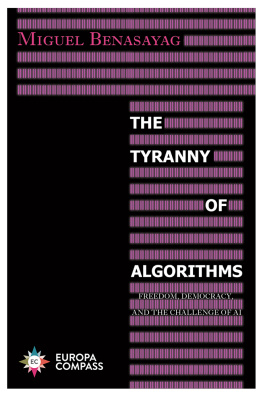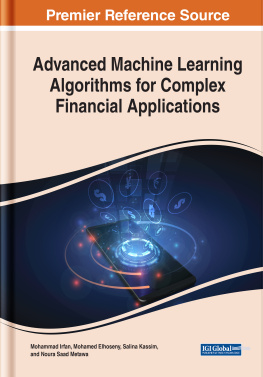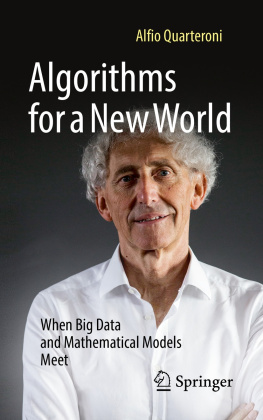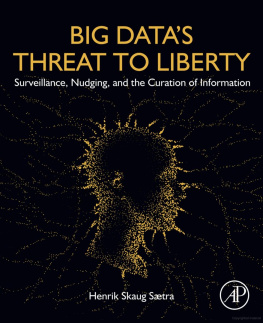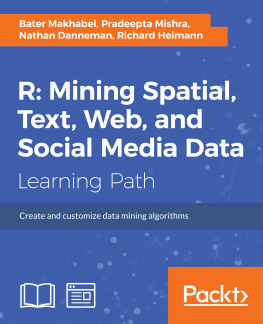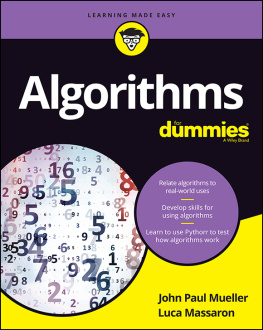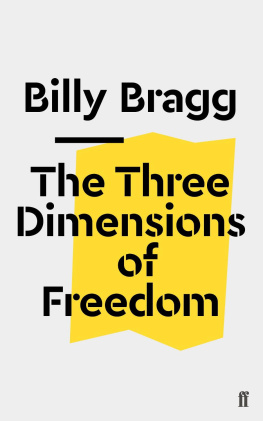THE TYRANNY
OF ALGORITHMS
P REFACE
We read all sorts of things about AI. In general, it is presented either as the promise of a future happinessindeed, as the possibility of becoming superhuman and attaining immortality, according to the credo of the promoters of transhumanism, from Yuval Harari to Laurent Alexandreor as a threat capable of putting an end to humanity, as in science fiction films like Terminator, among advocates of a complete return to nature, and in survivalist groups. But more serious and less fanciful reflection leads us to see that we cannot be for or against AI, insofar as it is already here and is not likely to disappear any time soon. The question we now face is rather how to exist qua human beings, individually, socially, collectively, in a world governed in large measure by algorithms. That is the question that Miguel Benasayag seeks to explore in these conversations. A philosopher and psychoanalyst of Argentine origin, a former resistance fighter active in the wake of Che Guevara, Benasayag here builds upon his earlier reflections on the relationship between living beings and machines. One of his most decisive contributions to the current debate is his demonstration of the specificity of the phenomenon of life: the human being is not analogous to a machine, contrary to an idea widespread in the public at large, as well as among scientists (in fields ranging from the neurosciences to biology).
The analogy between living beings and machines completely obscures the formers peculiarities: not only does the living being include a share of negativity (it is always burdened by various malfunctions and poor adaptations to the environment); it also operates in accord with a logic that Benasayag describes as integrative. That is, an organism is not a simple collection of organs, each of which executes specific functions, any more than it is reducible to a given amount of informationthat might be duplicated independently of its medium. Nevertheless, the work of computer scientists and AI specialists is shaped by these epistemological errors: for them, the brain is nothing more than a computer. As we will see, the consequences are disastrous for our freedoms.
This brings us to the second point in Benasayags thought that must be emphasized to make it easy to follow these conversations, namely the distinction he makes between functioning and existing. Since the dawn of humanity, technological objects have been hybridized with the human mind: it is we who have shaped them, but as we use them, they in turn shape our brain. With the development of new technologies (the internet, Big Data, the new generation of algorithms, social networks, applications for smartphones, etc.), this hybridization is becoming more and more apparent, and machines now threaten to colonize us if we use them badly.
Constant and immediate interactions via Facebook and Twitter, immersion in virtual reality through video games, engaging in athletics while connected to devices that measure and record our performance, the use of GPS in our cars... these all involve programs that interfere in our lives without our having always chosen to use them. For Benasayag, if we are not capable of controlling our use of these programs, we are reduced to no longer existing, but only functioning, like machinesthat is, reduced to pure efficiency and performance. An advertisement in the subway for music online, describing individuals as being in pause mode when they relax or in repetition mode when they are running on a treadmill, is a good metaphor for such a danger. Are we doomed, from now on, to be just performers of a set of routines whose omnipresence weakens our moments of consciousness (including boredom, error, doubt... ) and our capacities of imagination and concentrationin short, our ability to exist?
But, taking as our point of departure this need to resist colonization by machines on the personal level, in these conversations we also ask what impact the digital world and algorithms have on our societies. Yes, AI allows us to make many kinds of work easier (for example, by helping physicians with certain diagnoses), but these benefits often come at the cost of reducing people to sets of micro-data (the websites we visit, our purchases, etc., make it possible to predict, for instance, deviant behavior) and digital profiles, far removed from the human beings and their element of unforeseeability and freedom. Worse yet: the whole economy, that of large companies, financial markets, and states, is now subject to the decisions suggested by machines. We have entered, Benasayag tells us, the era of algorithmic governmentality in which leaders have knowingly delegated their decision-making to AI: a factory, a hospital, or a railroad has to be closed because algorithmic analysis has determined that it is unprofitable.
How, then, can we still talk about democracy? And, consequently, how can we organize collective action when confronted by a power based on the supposed infallibility of machines? Rejecting the great emancipatory narratives of the last century, Benasayag thinks that only small resistance groups, deciding to act here and now, will be able to thwart the tyranny of algorithms: in discussion groups, periodicals, and publishing houses seeking to foil ideologies; in associations aiding migrants and homeless people; in resistance zones (ZADs) where the inhabitants see themselves not as defending nature but rather as being part of it. That is, in groups that occupy terrain with their bodies, that de-virtualize social and individual life, and that are capable of increasingly colonizing digital machines in the service of emancipation. Let us hope that these conversations will help bring about a return of these conflict zones, which are necessary guarantees of democracy and freedom.
Rgis Meyran
See Cerveau augment, homme diminu (La Dcouverte, 2016), La Singularit du vivant (Le Pommier, 2017), and, most recently, Fonctionner ou exister (Le Pommier, 2018).
T HE F AILURE OF W ESTERN R ATIONALITY
To begin by setting the scene, explain your criticism of the expression artificial intelligence (AI).
In reality, what we call artificial intelligence is very badly named. In this expression, the word intelligence is only a metaphor. Even if its calculative ability exceeds that of human beings, artificial intelligence is incapable of giving a meaning to its own calculations. It is essential to distinguish the machines functioning from the intelligence of living beings, because living intelligence is not a calculating machine. It is a process that articulates affectivity, corporeality, and error and that presupposes the presence of desire and a consciousness, in human beings, of ones own long-term history. Human intelligence is not conceivable independently of all our other cerebral and bodily processes. To be intelligent, you have to have a body: the body is the site of passions, drives, long-term memory; it is where the memory of my parents or grandparents is reincarnated, where even the memory of the species evolution is conveyed!
Which is not the case for AI...
Contrary to animals, which think with the help of a brain housed within a body, which is itself situated within an environment, the machine has no body. AI produces calculations and predictions independently of any meaning. The question that the media so often dwell uponwhether a machine can be substituted for a human beingis therefore absurd, because it is the living being, and not calculation, that creates meaning. Some AI researchers are convinced that the difference between living intelligence and artificial intelligence is quantitative, but it is qualitative. The dominant point of view, even among researchers, maintains that the brains structure and processes are analogous to those of a machine with discrete states. That is why the living being is treated and formatted according to this credo, while ignoring what I call the singularity of the living. The latter has nothing to do with any kind of vitalism but instead refers to the radical difference between functioning and existing. Existence cannot dispense with functions, but neither can it be reduced and subjected to them.

